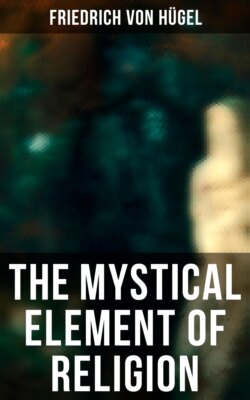Читать книгу The Mystical Element of Religion - Friedrich von Hügel - Страница 13
На сайте Литреса книга снята с продажи.
5. The experience of the human race: the two series of personalities, movements, races.
ОглавлениеAnd the secular experience of the race would seem fully to bear out such suspicions. For have we not there a double series of personalities, events, and movements far too long and widespread not to be conclusive? On the one hand, there are those that seem to spring from dimly lit or dark feeling, to arise,—as it were, hydra-like, to sting and madden, or mist-like, to benumb all life, and turn it into mere drift and dreaming,—from out of the obscure, undrained, swampy places of human ignorance and passion. On the other hand, there are those that are formed and fashioned by clear, transparent thought; and these flourish in the cultivated, well-drained plains of human science and strict demonstration.
Among the first series, you have the Pantheistic schools and personalities of the decaying Roman Empire, Plotinus the Ecstatic, and Jamblichus, and such other dreamers, straining up into the blue; the somewhat similar, largely subterranean, Jewish and Christian sects and tendencies of the Middle Ages; the Anabaptist and other like groups, individualistic, fantastic, in considerable part anomistic and revolutionary, of the Reformation period; and such phenomena as the Eternal-Gospel troubles and the Quietistic controversy in the Roman Church. And above all, in the East, we have, from time immemorial, whole races, (in the midst of a world crying aloud for help and re-fashioning, but which is left to stagnate and decay,) still dreaming away their lives in Buddhistic abstraction and indifference.
Among the second, the light, clear series, you have whole races, the luminous, plastic, immensely active Greek, the strong-willed, practical, organizing Roman, and the Anglo-Saxon determined “to stand no nonsense”; you have an Aristotle, sober, systematic; one side at least of the great Mediaeval Scholastic movement, culminating in St. Thomas, so orderly and transparent; above all, modern Physical Science, first subjecting all phenomena to rigorous quantitative and mathematical analysis and equation, and then reacting upon philosophy as well, and insisting, there and everywhere, upon clearness, direct comparableness, ready transferableness of ideas and their formulae, as the sole tests of truth. Descartes; Kepler, Galileo; Hobbes, Spinoza are, in increasing degrees, still perhaps the most perfect types of this clear and cool, this ultimately mathematical and Monistic tendency and position.
